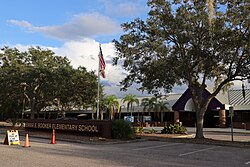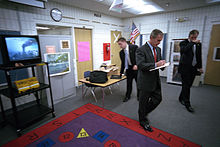Public elementary school in Sarasota, Florida, United States
| Emma E. Booker Elementary School | |
|---|---|
 | |
| Address | |
| 2350 Dr. Martin Luther King Jr. Way Sarasota, Florida 34234 United States | |
| Coordinates | 27°21′28.04″N 82°31′25.12″W / 27.3577889°N 82.5236444°W / 27.3577889; -82.5236444 |
| Information | |
| Type | Public elementary school |
| Motto | High expectations for all! |
| Opened | 1989; 35 years ago (1989) |
| School district | Sarasota County Public Schools |
| NCES School ID | 120168002904 |
| Principal | Edwina Oliver |
| Teaching staff | 42.00 (on an FTE basis) |
| Grades | Pre-K–5 |
| Enrollment | 560 (2018-19) |
| Student to teacher ratio | 13.33 |
| Color(s) | Purple, gold |
| Mascot | Tornado |
| Website | www |
Emma E. Booker Elementary School is a public elementary school in Sarasota, Florida, which opened in the fall of 1989. It is one of the Booker Schools, with a middle and high school of the same name nearby. It is a part of Sarasota County Schools. The school is best known as the school where United States President George W. Bush was visiting on September 11, 2001, when he learned of the terrorist attacks that were unfolding that day. The school received national attention.
The Booker Schools
The Booker Schools were named for Emma E. Booker, an African-American educator who began teaching at Sarasota County's first black school, Sarasota Grammar School, in 1918. Around that time, Ms. Booker began to take college classes during the summer school break. By 1923, she had become principal of the school, which had no physical building and used rented halls for classes. Her students "sat at desks made of orange crates, learning from hand-me-down books discarded from the white schools."
Julius Rosenwald, a part-owner of Sears, established the Rosenwald Fund in 1917 to help underfunded African-American schools in the South. Within the first few years of its establishment, the Fund provided the means for the first African-American school in Sarasota, located on 7th Street and Lemon Avenue, as Emma Booker had made the plight of the school known. The school (with four classrooms and an auditorium) opened with eight grades during the 1924–25 school year. On opening day, Emma Booker led her teachers and students from the Knights of Pythias rental hall to the new school. After 20 years of summer college attendance, she attained her bachelor's degree in 1937.
The Booker Schools were named in her honor in the late 1930s and were expanded to include a high school. When Emma E. Booker Elementary School was named in her honor, a newspaper editorial said: "Emma Booker persevered, personally encouraging students, underwriting their continued education and pressuring intransigent administrators to provide for blacks the same educational opportunities available to whites."
From 1939 to 1989, the Booker Schools all shared a campus at Myrtle Street and Orange Avenue in Sarasota. In 1966, 12 years after the U.S. Supreme Court case Brown vs. Board of Education ended school segregation, there were only 36 African-American students enrolled in the all-white high schools. In 1967, the Sarasota County School Board shut down Booker High School, resulting in the students there having to attend the all-white Sarasota High School. The Newtown community protested the Booker school closure by boycotting the public schools and sending their children to "freedom schools" at local churches. Booker High School reopened in 1970 and became a Visual and Performing Arts magnet school shortly thereafter. The combined Booker School campus was split into the Emma E. Booker Elementary School in 1989 and to the Booker Middle School in 2003, with the Booker High School being refurbished at the previous location.
2001 visit from President Bush

The school received international attention following a visit by United States President George W. Bush on the morning of September 11, 2001. He visited the school as part of an effort to promote his administration's education policy, particularly the No Child Left Behind Act. It was at the school that Bush learned of the second plane crashing into the World Trade Center, and where he made his first public comments about the September 11 attacks.
Report of attacks

The first plane crash at the World Trade Center happened about ten minutes before the president arrived at the school. A press pool photographer heard a radio message that White House Press Secretary Ari Fleischer would be needed to answer questions about a "crash" and that there was a call on hold from Condoleezza Rice. Bush entered the second-grade classroom of Sandra Kay Daniels where he introduced the class to Education Secretary Rod Paige and shook hands with Mrs. Daniels. He and the teacher then sat down facing the seated students to read the children's story, The Pet Goat.
At about 9:05 a.m. White House Chief of Staff Andrew Card whispered into Bush's ear, "A second plane has hit the second tower. America is under attack." Bush appeared tense but remained seated for roughly seven minutes and continued to listen while the children read in unison through the story, sometimes repeating lines to meet Mrs. Daniels's standards. The reading concluded with the phrase "more to come" and Bush asked the class, "What does that mean - 'more to come'?" After a student replied, he praised the students' reading skills and encouraged them to continue practicing, before he excused himself and left the room.
According to Bill Sammon in Fighting Back: The War on Terrorism from Inside the White House, Ari Fleischer was in the back of the classroom holding a pad on which he had written, "Don't say anything yet." Sammon contends that, although Bush was not wearing his glasses, he was able to read this message, and it went unnoticed by the media. Sammon further stated:
Bush wondered whether he should excuse himself and retreat to the holding room, where he might be able to find out what the hell was going on. But what kind of message would that send—the president abruptly getting up and walking out on a bunch of inner-city second-graders at their moment in the national limelight?
Press conference
Bush was scheduled for a short press conference in the school library after spending about 20 minutes total in the classroom. This was delayed by several minutes. When Bush appeared, he announced, "This is a difficult moment for America," and instead of the planned topic, addressed the country for several minutes about the plane crashes and the government's immediate response. He then left the school for Sarasota-Bradenton International Airport.
Aftermath
Bush's critics, notably Michael Moore in his film Fahrenheit 9/11, have argued that the fact that Bush continued reading the book after being notified that the attack was ongoing shows that he was indecisive. A 9/11 Commission staff report titled Improvising a Homeland Defense said, "The President felt he should project strength and calm until he could better understand what was happening."
A week later, Bush wrote to the school's principal, apologizing for not being able to stay longer.
Osama bin Laden made reference to the story in an unauthenticated videotaped speech released just prior to the 2004 U.S. presidential election, stating that Bush's reading of the book had given the hijackers more than enough time to carry out the attacks. His full quote was:
But because it seemed to him that occupying himself by talking to the little girl about the goat and its butting was more important than occupying himself with the planes and their butting of the skyscrapers, we were given three times the period required to execute the operations - all praise is due to Allah.
In the years following the incident, faculty and students of the school have come to the defense of Bush's actions. Principal Gwendolyn Tose-Rigell, who died in 2007, stated, "I don't think anyone could have handled it better. What would it have served if had jumped out of his chair and ran out of the room?"
Asked about the incident for Time shortly after bin Laden's death in 2011, two of the students from the classroom, Lazaro Dubrocq and Mariah Williams, credited Bush with keeping the classroom calm by finishing the story. Williams said, "I'll always remember watching his face turn red. He got really serious all of a sudden. But I was clueless. I was just seven. I'm just glad he didn't get up and leave because then I would have been more scared and confused." Chantal Guerrero agreed: "I think the President was trying to keep us from finding out, so we all wouldn't freak out."
References
- "Search for Public Schools - Emma E. Booker Elementary School (120168002904)". National Center for Education Statistics. Institute of Education Sciences. Retrieved August 18, 2020.
- ^ "Emma E. Booker Elementary School". National Center for Education Statistics. Retrieved August 18, 2020.
- "Booker School History". Booker High Visual and Performing Arts. Archived from the original on November 30, 2018. Retrieved August 18, 2020.
- ^ Lahurd, Jeff (April 16, 2014). "Emma Booker". Sarasota Herald-Tribune. Retrieved August 18, 2020.
- "Emma E. Booker Taught Generations and Transformed Black Education in Sarasota". Sarasota Magazine. Retrieved February 10, 2022.
- ^ "Sarasota History Biographies". All About Sarasota. Light Education, Inc. Retrieved August 18, 2020.
- "Booker Schools". Sarasota History Alive!. Retrieved August 18, 2020.
- Graff, Garrett M. "'We’re the Only Plane in the Sky'", Politico, September 9, 2016.
- "Teacher and student in classroom with President Bush on 9/11 share their stories". TODAY.com. Retrieved April 7, 2021.
- Monroe, Bryan. "Witness to history: White House photographer and the images of 9/11". CNN. Retrieved April 15, 2018.
- "Fla. Kids Watched Bush React to 9/11 News". ABC News. September 10, 2011. Retrieved April 15, 2018.
- "Sandra Kay Daniels". Los Angeles Times. September 11, 2002. Retrieved April 15, 2018.
- ^ Sammon, Bill (2002). Fighting Back. Regnery Publishing. p. 85. ISBN 978-0-89526-149-6.
- Adair, Bill; Hegarty, Stephen (September 8, 2002). "The drama in Sarasota". St. Petersburg Times. Retrieved June 15, 2007.
- Radosh, Daniel (July 26, 2004). "The Pet Goat Approach". The New Yorker.
- "Improvising a Homeland Defense" (PDF). p. 22.
- Sarasota County Schools. "Emma E. Booker Elementary". Sarasota County Schools. Archived from the original on May 9, 2016. Retrieved April 15, 2018.
- Bush, George W. (September 17, 2001). "To My Friends at Emma E. Booker Elementary School" (PDF). Letter to Emma E. Booker Elementary School. Archived from the original (PDF) on November 4, 2014. Retrieved August 18, 2020.
- Bush, George W. (September 17, 2001). "Dear Gwen" (PDF). Letter to Gwin Rigell. Archived from the original (PDF) on November 4, 2014. Retrieved August 18, 2020.
- Osama bin Laden (November 1, 2004). "Full Transcript of Bin Ladin's Speech". Al Jazeera. Retrieved March 20, 2006.
- ^ Padgett, Tim (May 3, 2011). "The Interrupted Reading: The Kids with George W. Bush on 9/11". Time. ISSN 0040-781X. OCLC 1311479. Archived from the original on March 9, 2019. Retrieved September 29, 2019.
External links
| September 11 attacks | |
|---|---|
| Timeline | |
| Victims |
|
| Hijacked airliners | |
| Crash sites | |
| Aftermath | |
| Response | |
| Perpetrators | |
| Inquiries | |
| Cultural effects | |
| Miscellaneous |
|